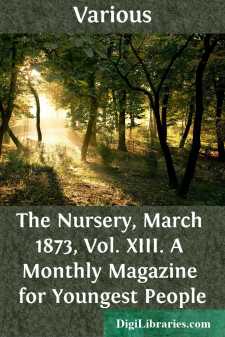Categories
- Antiques & Collectibles 13
- Architecture 36
- Art 48
- Bibles 22
- Biography & Autobiography 813
- Body, Mind & Spirit 142
- Business & Economics 28
- Children's Books 17
- Children's Fiction 14
- Computers 4
- Cooking 94
- Crafts & Hobbies 4
- Drama 346
- Education 46
- Family & Relationships 57
- Fiction 11829
- Games 19
- Gardening 17
- Health & Fitness 34
- History 1377
- House & Home 1
- Humor 147
- Juvenile Fiction 1873
- Juvenile Nonfiction 202
- Language Arts & Disciplines 88
- Law 16
- Literary Collections 686
- Literary Criticism 179
- Mathematics 13
- Medical 41
- Music 40
- Nature 179
- Non-Classifiable 1768
- Performing Arts 7
- Periodicals 1453
- Philosophy 64
- Photography 2
- Poetry 896
- Political Science 203
- Psychology 42
- Reference 154
- Religion 513
- Science 126
- Self-Help 84
- Social Science 81
- Sports & Recreation 34
- Study Aids 3
- Technology & Engineering 59
- Transportation 23
- Travel 463
- True Crime 29
The Nursery, March 1873, Vol. XIII. A Monthly Magazine for Youngest People
by: Various
Categories:
Description:
Excerpt
A TRUE STORY.
HEN I was in Boston about a year ago, I stopped one day at the corner of Washington Street and Franklin Street to witness a pretty sight.
Here, just as you turn into Franklin Street, on the right, a poor peddler used to stand with a few baskets of oranges or apples or peanuts, which he offered for sale to the passers-by.
The street-pigeons had found in him a good friend; for he used to feed them with bits of peanuts, crumbs of bread, and seed: and every day, at a certain hour, they would fly down to get their food.
On the day when I stopped to see them, the sun shone, and the street was crowded; and many people stopped, like myself, to see the pretty sight.
The pigeons did not seem to be at all disturbed or frightened by the noise of carriages or the press of people; but would fly down, and light on the peddler's wrist, and peck the food from the palm of his hand.
He had made them so tame, that they would often light on his shoulders or on his head; and, if he put food in his mouth, they would try to get it even from between his teeth.
The children would flock round to see him; and even the busy newsboy would pause, and forget the newspapers under his arm, while he watched these interviews between the birds and their good friend.
A year afterwards I was in Boston again; but the poor peddler and his birds were not to be seen. All Franklin Street, and much of the eastern side of Washington Street, were in ruins. There had been a great fire in Boston,—the largest that was ever known there; and more than fifty acres, crowded with buildings, had been made desolate, so that nothing but smoking ruins was left. This was in November, 1872.
I do not know where the poor peddler has gone; but I hope that his little friends, the pigeons, have found him out, and that they still fly down to bid him good-day, and take their dinner from his open hand.
The picture is an actual drawing from life, made on the spot, and not from memory. The likeness of the peddler is a faithful one; and I thank the artist for reproducing the scene so well to my mind. Folks do say that he has hit off my likeness also in the man standing behind the taller of the two little girls.
Alfred Selwyn.ROWDY-DOWDY.
Rowdy-dowdyloves a noise;Cannot play with quiet boys;
Cannot play with quiet toys:
Rowdy-dowdy loves a noise!
In the street he takes delight,—
In the street from morn till night:
Don't I tell the story right,
Rowdy-dowdy, noisy sprite?
Rowdy-dowdy's full of fun;
Never walks if he can run;
Never likes the setting sun:
That stops Rowdy-dowdy's fun.
He is full of prankish ways;
Never still one moment stays;
Boys are fond of boyish plays:
These are Dowdy's rowdy days.
Out at elbows, out at toes,
Out at knees, the urchin goes:
Still he laughs, and still he grows
Rowdier, dowdier, I suppose.
Rowdy-dowdy, don't you see,
Full of noisy, boys-y glee,
Is as sweet as he can be,
For the sprite belongs to me!
He is mine to have and hold,
Worth his weight in solid gold:
Ah!...












